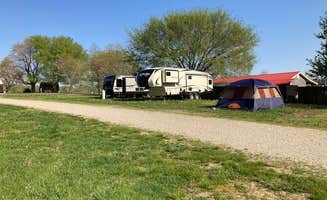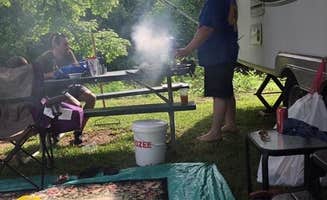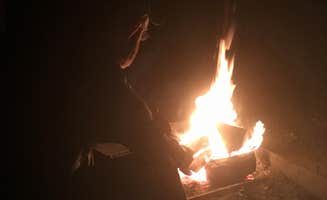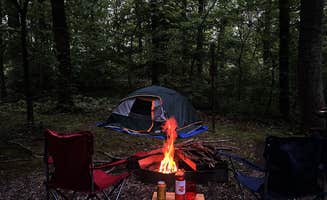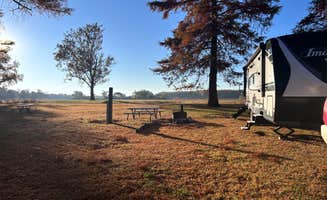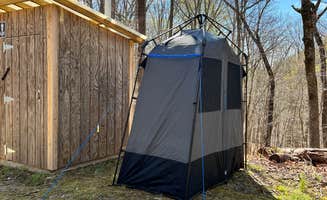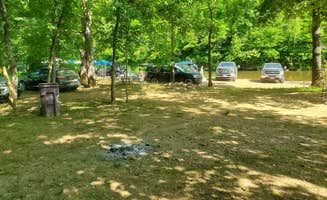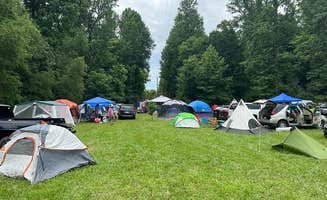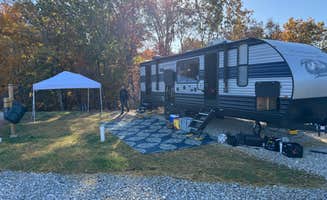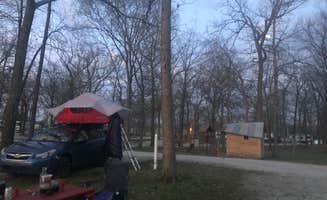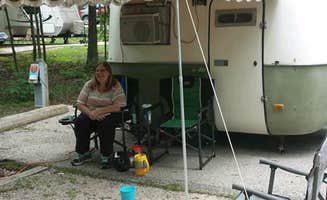Camping options around Whitewater, Missouri span across the region's unique Ozark foothill topography with elevations ranging from 350 to 500 feet above sea level. Most campsites in the area experience hot, humid summers with temperatures regularly exceeding 90°F from June through August, while spring and fall offer milder conditions ideal for outdoor activities. The region's proximity to multiple waterways creates varied camping microclimates, with riverside locations often cooler than inland sites.
What to do
Hiking trail exploration: Trail of Tears State Park Campground offers multiple hiking options with varying difficulty levels. According to visitor Livia W., "Great for hiking! If you want an easy hike it's available but there are an abundance of intermediate trail and a beautiful quarry! Be sure to pay attention to trails because lack of trail markers."
Fishing in stocked ponds: Several conservation areas near Whitewater maintain stocked fishing ponds accessible to campers. A visitor to Lake Girardeau Conservation Area noted it has a "nice sized lake good fishing if you are using a boat, or kayak," while another mentioned it's "a good area for fishing, kayaking or canoeing. It is a no-wake lake."
Water activities: The region offers multiple swimming and paddling opportunities, particularly during warmer months. As one camper at Sam A. Baker State Park Campground shared, "Beautiful camp sites and a beautiful river to paddle around on. This park usually isn't very crowded which is really nice. It is very tranquil and perfect for a weekend get away."
Wildlife viewing: Many conservation areas provide opportunities to observe local wildlife, especially during morning and evening hours. One visitor to Sam A. Baker State Park mentioned, "A friend and I even spotted a baby eastern spiny softshell turtle while crossing Big Creek!"
What campers like
Riverside relaxation: Many campers appreciate the waterfront access at several campgrounds. A visitor to Castor River Ranch Campground shared, "Really nice place on the castor river. The water feels good and is clear," highlighting the appeal of clear water access.
Affordability: Budget-conscious campers note reasonable pricing at many sites. One camper at Little Ole Opry Campground mentioned they "decided to give Little Ole Opry a try as our last overnighter on our way back to our home base" because the $15 per night rate was attractive.
Privacy and tranquility: Less-developed sites offer quieter camping experiences. A Sam A. Baker State Park visitor noted, "The primitive sites are nice and feel secluded. The park attendant is always friendly and great!"
Convenience to urban amenities: Some campgrounds provide easy access to nearby towns for supplies. As one Trail of Tears State Park Campground visitor noted, "Not a large state park, but the campgrounds, small lake with swimming area, and the views of the Mississippi River valley are good. There are a few larger towns within about 10 miles where you can get all the supplies you need for camping."
What you should know
Road conditions vary seasonally: Access roads to more remote sites can become challenging after rainfall. A visitor to General Watkins Conservation Area noted, "The last mile is good, but very dusty, gravel road," while another mentioned "Road coming into the camp ground can get a little rough depending on season, but it's gravel."
Limited cell service: Many conservation areas have spotty or nonexistent mobile connectivity. A camper at General Watkins reported, "No cell coverage in the parking lot for T-Mobile, some coverage on loop trail."
Site availability challenges: Some smaller conservation areas fill quickly during peak seasons. One camper noted about General Watkins, "This campground will always be packed for Missouri firearm deer season. Mid November. But normally has open spots rest of the time."
Varied restroom facilities: Bathroom amenities range from primitive to modern across sites. At Castor River Ranch Campground, a visitor described, "The bathroom is a single person bathroom but it was really nice and air conditioned and has a stand up shower with wood walls and tile floor. There was never a wait for the bathroom it was always open."
Tips for camping with families
Swimming opportunities: Several locations feature designated swimming areas ideal for children. At Whippoorwill Lake Campground Resort, a visitor noted, "Lake has sandy beaches. Small playset in the water for kids."
Cabin alternatives: For families seeking more comfort than tent camping, several locations offer cabin rentals. A Whippoorwill Lake visitor shared their cabin "was a double bed and also had a set of bunks. So plenty of room."
Nearby attractions: Parents appreciate campgrounds with proximity to additional activities. A camper at The Landing Point RV Park mentioned, "Water park close by (5 minute drive) that was great for the kids on a hot day."
Open play spaces: Campgrounds with communal areas provide room for children to play. One visitor to The Landing Point RV Park noted, "There is a big grassy area in the middle of the loop of wanting to play games and run around."
Tips from RVers
Site leveling considerations: RV campers should prepare for varied site conditions. At The Landing Point RV Park, a visitor observed, "Large sites with level concrete," while another camper at Little Ole Opry noted site challenges: "When we tried to put down our MoRryde steps they sat wonky on the wood site trim plus recent rain made us nervous about putting our levelers down and sinking."
Utility hookup planning: RVers should check hookup locations and bring extension cords or hoses. One camper detailed, "I needed 20' of sewer hose and 35' of water hose. The water pressure was very good at around 60 psi but you share a spigot with an adjacent site."
Seasonal considerations: Winter camping requires planning for limited water availability. A Trail of Tears State Park camper noted, "The park was clean and well maintained in almost perfect conditions," but visitors should verify which utilities remain operational during colder months.
Size restrictions: Not all campgrounds accommodate larger RVs. At General Watkins Conservation Area, a camper mentioned, "Spots are perfect for smaller rigs," indicating larger vehicles might face challenges.


